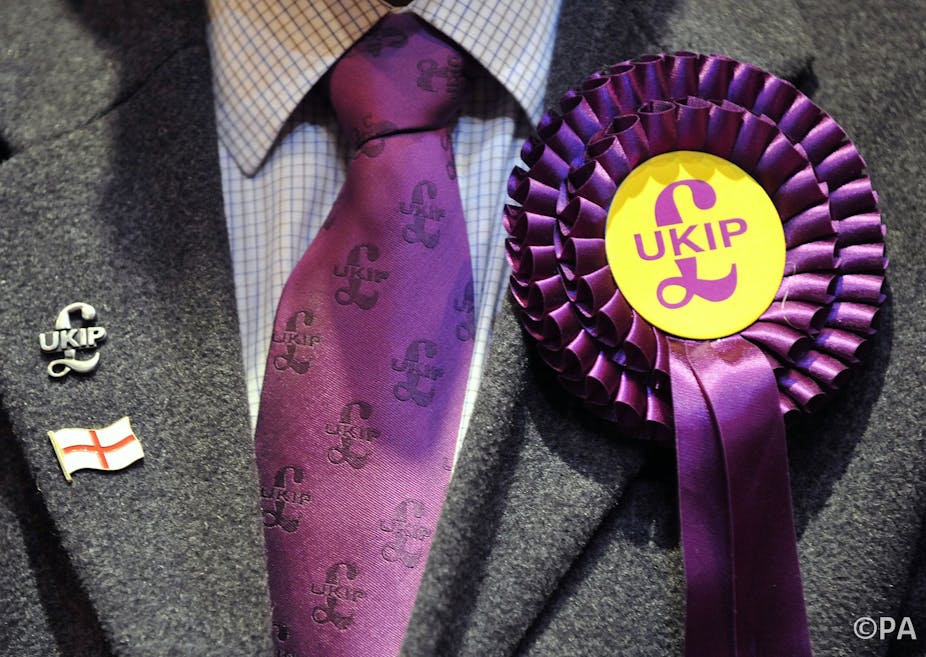Until now, the policies of the UK Independence Party (UKIP) have been symbolic rather than substantive. Policy statements by the party’s leader, Nigel Farage, have been designed to build a populist support base rather than blueprint the practical work of government.
UKIP has defined itself by what it does not like – Europe, immigration, modernism – against the backdrop of an imagined past when Britain was Britain, and Britain was Great. This stance has worked well, with the party achieving 15% support in some polls.
With this change to the political game, the UK election on May 7 now has several possible outcomes. One is a coalition government bringing the Conservatives together with UKIP. Suddenly, there is the real possibility of UKIP ministers with responsibility for portfolios that make a difference to people’s lives. UKIP’s positions will come under more scrutiny. A key area is education, including higher education.
UKIP’s website contains a list of “policy announcements” made at the most recent party conference at Doncaster. These are essentially bullet points designed to hit popular buttons, without detail. At this stage there are just nine sentences on education and skills. Farage’s party promises that “more detailed announcements will be made in the run up to the 2015 General Election”. However, we can infer more of UKIP’s likely education policy in government by extrapolating its stance on other issues, especially immigration.
Schools and apprenticeships
UKIP takes us back to the future with proposals for apprenticeships decoupled from secondary schooling, and the restoration of grammar schools for selected students. Farage argues that this will restore older routes for working class social mobility, though he sidesteps the fact that these mechanisms only ever provided real mobility for a small minority. Grammar schools, like private schools today, were bastions of the middle class.
There are no UKIP proposals for lifting the educational and social outcomes of mainstream state school students, except that UKIP “supports the principle of free schools that are open to the whole community and uphold British values”, and “schools will be investigated by OFSTED” on “the presentation of a petition signed by 25% of parents or governors”. This sounds like a formula for continuing culture wars around multiculturalism.
Scrap the 50% university target
In higher education the most important statement so far is that “UKIP will scrap the target of 50% of school leavers going to university”. This is a classic pre-Thatcher conservative position on higher education, consistent with the idea of restoring grammar schools, which presumes that only a small number of naturally bright students are capable of advanced educational achievement.
In opposing the now dominant UK policy of growing university participation, UKIP has set itself against the policy norm in Europe and throughout most of the world, and against popular demand for expanding opportunities.
It has also set itself against the main social and economic trend. UNESCO data shows that between 1992 and 2012 the worldwide gross tertiary enrolment ratio, including both university and non-university students, rose from 15% to 32%. Across the whole of Europe and North America, participation in tertiary education now exceeds 60% with the majority of students in degree courses. There is every sign that the educated population will keep on increasing. Nostalgia for a return to a more exclusive education system may appeal to some older voters but is futile symbolism rather than genuine policy.

At this stage, UKIP has made no policy statement on tuition and student loans, except that it would remove tuition fees from students in science, technology, engineering, maths and medicine on the condition that they live and work in the UK for five years after graduation. UKIP’s deputy leader and education spokesman, the MEP Paul Nuttall, backed students campaigning to abolish all fees in November 2014, but this is not UKIP policy.
Stance on international students
In its only statement about international education, UKIP says that students from the EU would pay the same fee as non-EU students. This is consistent with the party’s position for Britain to leave the EU.
Of larger concern is UKIP’s unstated position on non-EU students. According to estimates by the Department of Business and Industry, UK education and training exports are worth £14 billion a year to the UK economy, including £2.4bn directly from student tuition fees. In a climate hostile to immigration, reducing non-EU student numbers is an easy way to bring down net annual migration numbers.
Non-EU students already grapple with a restrictive, slow and expensive visa regime; increased regular surveillance during the period of study; and reduced graduate work rights. Graduates must find a job paying £24,000 per year within four months or lose their visas. In Canada and Australia the equivalent international student graduates have access to bridging visas that provide them with two years or more to find work.
In a recent move that can be read as a prominent Conservative leader trying to out-UKIP UKIP, home minister Teresa May argued that post-graduation bridging visas for non-EU students should be totally removed. The further truncation of graduate work opportunities would probably trigger a sharp decline in international student entry. A tough approach to visas and the inward movement of foreign talent would also harm UK science and technology, as business leaders have argued, especially as the US, Germany, Switzerland and other science-strong nations provide open doorways.
The possibility that UKIP may urge for May’s policy or something similar within a coalition government, and that the Conservatives would listen, is a principal concern of UK universities.
Next read: The five options for student tuition fees that politicians have to choose from.

